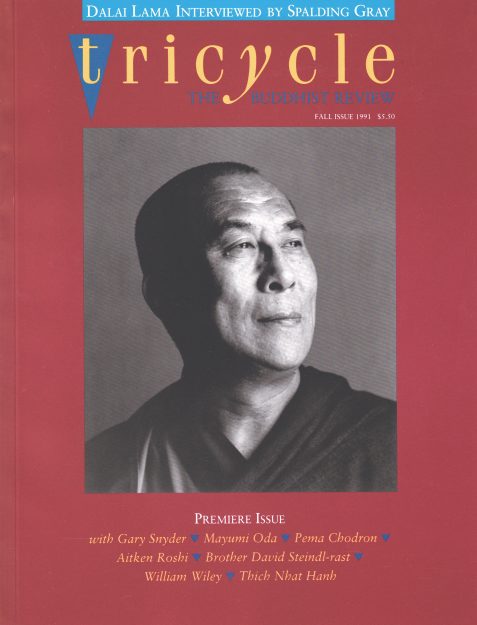When Tricycle’s founders published their inaugural issue in the fall of 1991, they had little assurance the modest niche quarterly would make it beyond its first three months, let alone its first year. But a glance at the table of contents for the first issue offers a preview of how Tricycle would fulfill its mission as the first independent and inclusive Buddhist magazine.
 A special section on the International Year of Tibet featured Spalding Gray’s interview of the Dalai Lama and a dharma talk on renunciation by Buddhist nun Pema Chödron—two prominent Buddhists who have since appeared many times in our pages. An interfaith roundtable on “Authority and Exploitation,” with Benedictine monk David Steindl-Rast joining Zen teacher Robert Aitken Roshi and psychotherapist Diane Shainberg, established a format we have used often to explore sensitive issues facing Buddhist practitioners and, indeed, spiritual seekers of every sort.
A special section on the International Year of Tibet featured Spalding Gray’s interview of the Dalai Lama and a dharma talk on renunciation by Buddhist nun Pema Chödron—two prominent Buddhists who have since appeared many times in our pages. An interfaith roundtable on “Authority and Exploitation,” with Benedictine monk David Steindl-Rast joining Zen teacher Robert Aitken Roshi and psychotherapist Diane Shainberg, established a format we have used often to explore sensitive issues facing Buddhist practitioners and, indeed, spiritual seekers of every sort.
Gary Snyder’s article on poetry and meditation and an interview with screenwriter Bruce Joel Rubin presaged Tricycle’s frequent coverage of Buddhism in the arts. Features on AIDS and politics forecast our ongoing concern with addressing timely controversial issues. Thich Nhat Hanh’s observations on the Buddha’s first women disciples, poet Andrew Schelling’s examination of cross-species compassion in the Jataka Tales, and religion professor Stuart Smithers’s comments on translating Buddhist texts were the first of many articles on traditional Buddhist teachings. Also included in the issue were Michael Hurson’s cartoon strip and Larry Shainberg’s arch observations on Buddhism and sports: humor would have a rightful place in Tricycle’s coverage of Buddhist life.
Reflecting the depth of Buddhist teachings and breadth of themes touched by Buddhism in today’s world,Tricycle, supported by a passionate readership, not only survived those early years but continued to grow. All along, in letters and emails, responses and comments, you—our readers—have expressed your desire to come together to discuss, contribute to, and live the great experiment of establishing the dharma in the West. As we identified for this anniversary issue the articles that would highlight Tricycle’s evolution over the past two decades (“20 Years, 20 Stories”), it became clear that “underlying the story all along has been the building of a community and culture, something larger than the sum of its parts—a context, a conversation.”
There are now teachers in the West—Westerners as well as our root teachers and mentors from the East—who have practiced and taught the dharma for decades. We offer our deepest gratitude to them for their essential role in supporting Tricycle’s efforts from the beginning. Many of them have joined us online, where Tricycle Retreats have become a mainstay of the growing Tricycle Community. Our online presence has enabled us to reach people in every corner of the world and invite them to join the conversation. From time to time, we hear from Community members serving in Afghanistan and helping to build fledgling sanghas in countries like Kenya, Brazil, and Iran. And this summer we hosted our first online film festival, in collaboration with BuddhaFest, a program headed by Eric Forbis and Gabriel Riera of Washington, D.C.’s Insight Meditation Community. The festival was a great success, with Community members joining us from as far away as Italy, Israel, Taiwan, and Australia.
It has been a wonderful two decades, far surpassing anything Tricycle’s founders ever dreamed. With your continued support and friendship, we look forward to decades to come. For now, our gift to you is an e-book of teachings from Tricycle over the last twenty years. Click here to find out how to download it. Enjoy!
Thank you for subscribing to Tricycle! As a nonprofit, we depend on readers like you to keep Buddhist teachings and practices widely available.